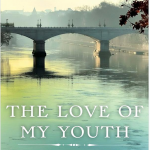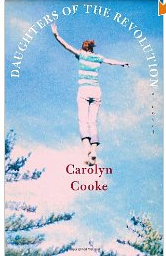 I am generally a fan of Mary Gordon’s fiction, and her new novel “The Love of My Youth,” set in Rome, should have been enchanting. In it, Adam and Miranda, lovers in high school and college, meet again in Rome many years later. They walk and talk and surmise things about each other. The descriptions of Rome are tender and accurate; I particularly loved the description of the market in the Campo dei Fiori. And the descriptions of walking in the Borghese Gardens, as well as the delicious description of Bernini’s Apollo and Daphne in the Borghese Gallery. But the novel left me unsatisfied . . . and it took me a while to figure out why. I couldn’t quite believe in the characters, who we mostly see through their conversations, and I didn’t find their behavior compelling. The conflict between them had been resolved long ago, and their meeting up again after nearly 40 years did not revive it. Nina Sankovitch
I am generally a fan of Mary Gordon’s fiction, and her new novel “The Love of My Youth,” set in Rome, should have been enchanting. In it, Adam and Miranda, lovers in high school and college, meet again in Rome many years later. They walk and talk and surmise things about each other. The descriptions of Rome are tender and accurate; I particularly loved the description of the market in the Campo dei Fiori. And the descriptions of walking in the Borghese Gardens, as well as the delicious description of Bernini’s Apollo and Daphne in the Borghese Gallery. But the novel left me unsatisfied . . . and it took me a while to figure out why. I couldn’t quite believe in the characters, who we mostly see through their conversations, and I didn’t find their behavior compelling. The conflict between them had been resolved long ago, and their meeting up again after nearly 40 years did not revive it. Nina Sankovitchwitz, of Readallday.org, thinks the last third of the novel, where the resolution is described, is worth the wait. I found it to be something of a letdown. I thought the story of their college classmate Valerie, who lives in Rome and is the mechanism by which Adam and Miranda reconnect, might have made a more interesting novel – she clearly made some interesting compromises. In their somewhat insensitive way, Adam and Miranda gloss over them. What did you think? Discuss in the comments.
Brooklyn Bugle Book Club: Revolutionary School – Daughters of the Revolution by Carolyn Cooke
July 15, 2011Carolyn Cooke’s novel, “Daughters of the Revolution,” is a curious book, in all good senses of the word. The novel covers the years 1963-2005 at the Goode School and its surrounding town. Several revolutions—the sexual revolution, the quieter, smaller but still potent revolution that resulted in first, African-Americans, then girls, then African-American girls being admitted and eventually becoming valued—provide the events, and the subtext, of the novel. “Daughters of the Revolution” more or less describes events in the lives of the Headmaster Goddard Boyd, known familiarly as “God,” and a few other alumni, staff, spouses, and children connected to the school. And to each other.
The school itself, though its influence is deeply felt, never actually takes form. It floats mistily off the shore of Cape Wilde, the mythical North Shore town where much of the novel takes place. This is not The Rector of Justin. I found it potent stuff, though I’m aware that some readers might find it obvious. (The “Goode” School. Really?) What do you think? Which revolutions did you live through? Did Carolyn Cooke capture them? Share your impressions in the comments.
(Note: Updated August 25, 2011)
From the Web
Brooklyn Bugle Book Club: Christianity The First 3000 Years by Diarmaid MacCulloch
July 9, 2011Back in 2003 Diarmaid MacCulloch, an Oxford don, published a magisterial book called The Reformation: A History. That book weighed in at 687 pages of text, every one of them a model of clarity, but, as MacCulloch explains in the introduction to the new book, it raised more questions for him. Now the American edition of his subsequent book, Christianity: The First 3000 Years, written to answer those questions, has made its way into the house. As you can see, this one is even longer. Continue Reading…
From the Web
Ann Dunham was an anthropologist with a Ph.D. who spent most of her professional life working on microfinance, cottage industries, and other development programs helping poor rural folk in Indonesia. She was also Barack Obama’s mother, and A Singular Woman is Janny Scott’s fascinating new biography of her.
Dunham, who was born in 1942, lived a complicated life that was cut short much too young. She married, first, an African and second, an Indonesian. Dunham left college a rather muddled young woman, uncertain of her place in the world, and already the mother of a young child (Barack Obama was born when she was still 18). She traveled far from her children for a large part of the time they were growing up. She was curious and open to other cultures, and she made the most of her jobs and life abroad.
Dunham developed into an accomplished middle-aged woman who was very successful in her last couple of jobs, and Scott describes that growth quite effectively. She also illustrates Dunham’s meticulous working methods. With bankers, Dunham was “professional, methodical, and not the least bit eccentric.” But with villagers, with whom she could speak in Indonesian, she was empathetic and genuinely curious. “To her young research assistants, [Dunham] emphasized accuracy, rigor, patience, fairness, and not judging by appearances. ‘Don’t conclude before you understand,’ [one of them] recalled Ann saying. ‘After you understand, don’t judge.'”
Ann Dunham also sounds like a woman with a wonderful sense of humor whose friends loved her dearly. She was sadly overwhelmed by finances and illness at the end of her life – she died in 1995 just weeks before her 53d birthday. Scott does a terrific job showing how Dunham’s parents and upbringing shaped her, and suggests how she in turn shaped her oldest child. I would have liked to know more about Indonesia’s complex post-colonial history, but I can also see how including that information would have made for a much longer book. That aside, this is a book worth reading even if you are not a fan of the 44th president.
Do you agree with Scott that Ann Dunham is a fascinating character in her own right? Discuss in the comments.
Janny Scott on NPR’s Fresh Air
Read an excerpt from A Singular Woman (via NPR)
A Singular Woman
Janny Scott
Riverhead Books, $26.95, 374 pages
From the Web
Like her first book, Bo Caldwell’s new novel is set in China. Instead of bustling, commercial, cosmopolitan Shanghai, in City of Tranquil Light Caldwell tells the story of Will Kiehn, a Mennonite missionary in a remote provincial town. Arriving in 1906 and staying until 1933, Kiehn and his wife Katherine survive the upheavals in China, making friends with various neighbors, converts, and functionaries.
The pacifist missionary makes a surprisingly effective observer of life on the other side of the world—and Caldwell inserts passages from his late wife’s diary to illustrate a different perspective on events, when he’s not. Don’t let the missionary’s point of view put you off, this is a book describing a half-century’s worth of cross-cultural encounters worth reading regardless of your religious views.
My only reservation is the regular appearance of a bandit, Hsiao Lao. He’s there for purposes of plot, not parable, but he arrives at too many opportune moments not to appear contrived.
Have you read this book? Discuss below in the comments!


